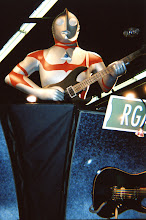
You might think Limp Bizkit's oeuvre and their ghastly fanbase of hooting fratboy morons might act as a dire warning to anyone trying to meld hip-hop and heavy metal, but apparently not. Artistically, at least, rap-metal seems to be pop's own Red Bull Flugtag: the best you can hope for is an inglorious plummet, with a load of berks in big shorts cheering you on, but that doesn't seem to stop people getting involved. Either people view it as a challenge or they've noted that, ever since Walk This Way revived Aerosmith's career and catapulted Run DMC to mainstream stardom, it's carried the promise of untold riches: you might think Limp Bizkit's records are unlovable by anyone who isn't an idiot, but their sales figures suggest there might be a lot of idiots knocking about the place.
And perhaps Wayne Carter can trans form rap-metal's image. After all, he's big on confounding expectations. It wasn't just that 2008's Tha Carter III bucked hip-hop's declining commercial fortunes by selling more than a million copies in a week, it's that it did it with a sprawling, strange, wildly inventive and brilliant album: it succeeded by challenging the listener, rather than pandering to the lowest common denominator. That said, the omens for his rock album Rebirth augur ill. It's been endlessly delayed. Collaborations with Lenny Kravitz and Pete Wentz, of trainer-bra pop-punkers Fall Out Boy, were announced, then scrapped.
Instead, the album relies on a host of hip-hop producers and session musicians drawn from the recording world's most rarefied echelons, where your talent demands an amazing nickname: Eddie "Krack Keys" Montilla, Calos "Apocalypto" Hernandez, Edward "Jewfro" Lidow and the thought-provokingly named Finis "KY" White. But here, poor old Apoclaypto, Jewfro, KY et al have been employed to try and copy the sound of a heavy metal band trying to copy the sound of a hip-hop record. Too much Xeroxing invariably degrades the image: the result crawls agonisingly along like a bloke on a donkey cart in the São Paulo rush hour. There's no punch, no brute force, a state of affairs not helped by a mix that places the band far behind Carter's vocals: they sound as if they've been locked in a cupboard. But he sounds even worse. No great shakes as a singer, he's slathered himself in Auto-Tune, which turns out to be one of the least appealing conjunctions of technology and human voice imaginable. On Tha Carter III, he demonstrated an audacious genius by taking horrible sounds – not least the repetitious sample that drove A Milli – and turning them into inexplicably compulsive listening. Here he seems to have pared down this technique by the simple expedient of not bothering with the audacious genius/inexplicably compulsive listening bit.
On Tha Carter III, the words tumbled out in a torrent of surreal images and non sequiturs so dizzying it provoked one critic to compare him to Marcel Duchamp. Here, there's a dispiriting number of hackneyed rock'n'roll cliches about groupies and "the road". Given that everyone knows Carter can do so much better than this, it all smacks a bit of condescension, of locating a different audience, then talking down to them. It's hard to work out whether he's doing this as a result of ignorance – perhaps he hasn't bothered to listen to many rock records and actually thinks that's what the lyrics have to be like – or the opposite: perhaps he's done a lot of market research, noted the kind of character that constitutes rap-metal's fanbase and come to the conclusion that the dizzying flights of Dadaist invention might be pitching it a bit high.
Alternatively, he might just be feeling uninspired. When he stops with the sub-Mötley Crüe stuff, he offers the odd great line – Drop the World hinges on a conceit about commandeering a spaceship in order to pick up a planet and throw it at the head of an ex-lover – but elsewhere, things take a turn for the mundane: "Born and raised in the USA, where the president is B-L-A-C-K," he offers. Official figures suggest this makes Lil Wayne the 4,068th rapper to mention that Barack Obama is African American; apparently they're worried that everyone outside the hip-hop world thinks he's Swedish.
There are still flashes of inspiration on offer, but rather tellingly, they tend to arrive when Carter abandons the widdly-woo solos and plodding drums. The guitars on Da Da Da switch grippingly from hyperactive funk to weird atonal crunching. On Fire is a bizarre cocktail of hiccupping breakbeats and Giorgio Moroder Eurodisco, which reminds you what Lil Wayne can do. For the most part, though, Rebirth underlines what he can't: the problem of rap-metal remains unsolvable, even by him. (source)


No comments:
Post a Comment